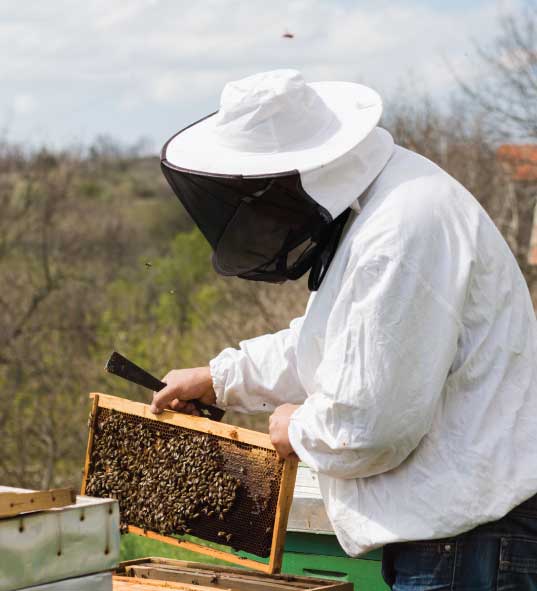Producing honey is by no means exploiting swarms
What beekeepers often hear is that their work interferes with the life of bees. Unfortunately, there is still a lot of misinformation on this topic.
The production of honey and, in general, the work of beekeepers , does not cause any harm to bees, quite the contrary! Each breeder has a great cultural background regarding the sector in which he operates.
Beekeepers are able to work in symbiosis with bees . They are able to intervene and improve their quality of survival by helping swarms against parasites and diseases and providing them with nourishment when it is scarce.
Beekeepers never look at their remuneration but are committed primarily to the life of their bee colonies. If you have doubts about it, continue reading the article. You will discover that consuming honey is a completely ethical choice that absolutely does not violate the life and health of bees. Here is a lot of useful information.
What do beekeepers do?
Beekeepers do their utmost to provide for their livelihood but also to protect the life of bees . In difficult times like the present, bees are in sharp decline. The work of beekeepers greatly helps these insects in survival.
It is absolutely not true that producing honey is the result of "intensive bee farming". In the production process, breeders interact with these animals in full respect of their natural rhythms.
This happens for two reasons: the first is ethical in nature. A good beekeeper would never harm his colony. The passion for this work leads us towards a loving and respectful attitude towards these animals.
The second reason is of an economic nature. Damaging the bees would consequently mean running into losses. To carry on activities of this kind, the swarms need to remain healthy and strong at all times.
Ensuring all this is, in short, the beekeeper's job. We do not stress our bees, this could weaken them and make them less productive. We offer the swarms everything they need such as a hospitable environment for their settlement , sources of nutrition and water.
We protect our bees from parasites and diseases with appropriate treatments, without using antibiotics .
Is it right to take honey from hives?

Let's never forget that in nature bees are constantly exposed to dangers and predators. As we all know, many animals are fond of honey. For example, bears are used to steal all the honey from the bees reaching even the highest hives and causing the destruction of the swarms.
The intervention of the beekeeper is by no means comparable to that of a predator. When honey is taken from hives, farmers remove only a small percentage (10% or 15% of the total).
Each hive has a lower area, the largest, which is where the new bees are born. This part also contains honey reserves which are never removed by beekeepers.
The top drawer with the handles recessed into the wood is the super . It is smaller than the hive, it is inserted at the beginning of flowering even on several levels and is the only area from which honey is taken.
Removing more honey than necessary won't allow the bees to survive! So don't worry, a beekeeper will never allow his bees to starve. Indeed, if necessary, in very long winters when food is scarce, he himself will feed them through a special sugar syrup instead of honey.
Respect for bees above all else
Honey is the result of a complex transformation mechanism. Bees collect pollen and nectar from plants and flowers and then regurgitate it. Honey is therefore the product of some plant components mixed with enzymes produced by the bees themselves.
Every beekeeper fully respects the work of his bees, treating them with care and preserving their health.
Any product coming from bees such as royal jelly, the wax layer and honey, must be taken so as not to harm the bee families in any way.
What a good breeder does
A good beekeeper is one who puts the life of bees first. Buying honey from supermarkets means not fully knowing the production processes. In fact, in large realities it can happen that bees are subjected to heavier production rates due to stimuli that encourage them to produce more than they should.
When buying honey, always turn to professional beekeepers who offer you 100% natural quality products. Buying honey from beekeepers also means giving support to realities that respect the life of bees. We do not exploit our swarms, we work in symbiosis with their natural mechanisms.
A good beekeeper knows when to intervene and, conversely, when to let their bees free to behave as their natural instincts require. We never resort to artificial inseminations.
Bees are capable of pain. Any operation carried out, starting from taking the supers must not disturb them in any way. Only in this way is it possible to carry on a healthy and strong swarm.
Sale of queen bees, cores and bee packs online
Do you need bees for your farm? Buy directly online! Apicoltura Laterza ships its products throughout Italy and throughout Europe! We take care of the production and sale of virgin and fertile queen bees , Ligustic queen bees and Buckfast queen bees.
Discover now the promo on bee cores and buy in a few clicks on: www.apicolturalaterza.it

 English
English  Italiano
Italiano  Estonian
Estonian  Finnish
Finnish  Français
Français  Deutsch
Deutsch  Latvian
Latvian  Norsk
Norsk  Polski
Polski  Română
Română  Español
Español  Svenska
Svenska